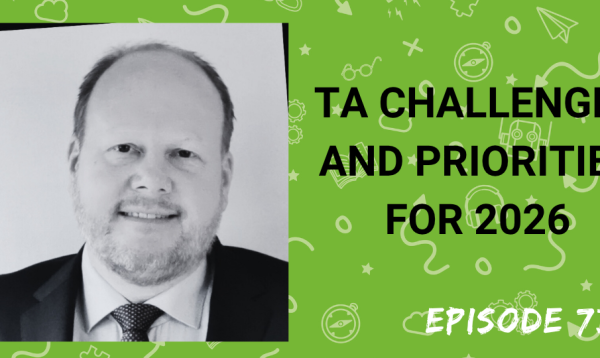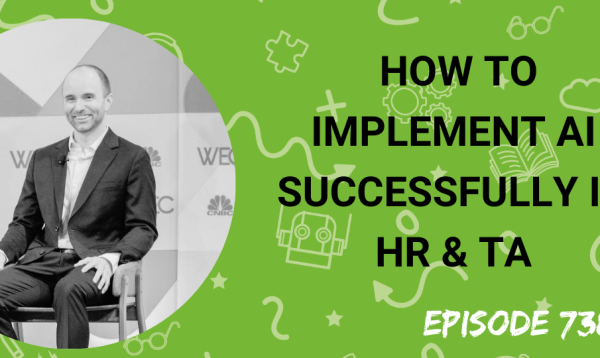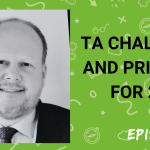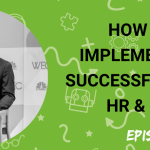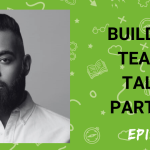Candidate experience is a topic we’ve covered time and time again on this podcast, mainly by looking at employers who are innovating in this area. It is clear though that delivering even an acceptable level of candidate experience is still problematic for most companies. So what is the current state of the candidate experience and what can employers be doing to get a competitive advantage?
My guests this week are Martin Dangerfield and Neil Harrison, both of whom are well known consultants in talent acquisition. They have recently collaborated on a piece of research that collected candidate experience insights from a variety of employers
In the interview we discuss:
- The importance of candidate experience in the current labour market
- Where does candidate experience start and end
- Who owns the candidate experience
- Key moments of truth
- The increasing importance of review sites
- The relationship between talent acquisition and hiring managers
- Data, measurement and the importance of optimisation
- Getting competitive advantage.
You can find the full report here.
Subscribe to this podcast in Apple Podcasts
Transcript:
Matt Alder [00:00:00]:
Support for this podcast comes from Smart Dreamers. Smart Dreamers helps your HR team to accelerate talent acquisition with unique end to end marketing automation software built specifically for recruitment. Companies from L’Oreal and UiPath to Temenos and Jempack use smart dreamers to automate their talent acquisition channels and processes. Their clients are powering talent acquisition at a fraction of the cost and generating employer brand gravity in the process. This means more better candidates and lower cost per hire. No matter what recruitment software you’re using. Smart Dreamers integrates with all of them, a perfect fit for your software ecosystem. If you want more better candidates at a fraction of the cost, visit www.smartdreamers.com. that’s www.smartdreamers.com to learn more and schedule a demo.
Matt Alder [00:01:11]:
Hi everyone, this is Matt Alder. Welcome to episode 199 of the Recruiting Future podcast. Candidate experience is a topic we visited time and time again on this show, mainly by looking at employers who are innovating in this area. It’s clear though that delivering even an acceptable level of candidate experience is still problematic for most companies. So what’s the current state of candidate experience and what can employers be doing to get competitive advantage? My guests this week are Martin Dangerfield and Neil Harrison, both of whom are well known consultants in talent acquisition. They’ve recently collaborated on a piece of research that collected insights from a variety of employers about the state of their candidate experience and I’m delighted they’re here to share some of the results.
Matt Alder [00:02:12]:
Hi Martin and Neil and welcome to the podcast. Could we just start by you introducing yourselves and telling us what you do?
Martin Dangerfield [00:02:20]:
Sure. It’s Martin Dangerfield. How are you? I run a business called Dangerfield Cunningly and we help people to hire better. We help people to look at how they hire as in the process, the technology, the people involved. And we also provide an embedded recruitment service mostly for technical businesses, but more and more looking at other things as well.
Neil Harrison [00:02:40]:
My name is Neil Harrison. I support Martin in terms of the discovery, the insights around why candidates might join one organization, why they might not join them, some of their perception, some of their feelings, largely in order to we can influence the EVP and the employer brand that sits behind that.
Matt Alder [00:03:00]:
Great stuff. Well, brilliant to have you guys on the show and you know, welcome back Neil, because you, you were actually on a few a few weeks ago. Now I know that you’ve recently Collaborated on a piece of research about candidate experience. How did the research come about? And you know, why, why did you, you. What was the motivations for doing it?
Neil Harrison [00:03:21]:
Yeah, fairly fundamental question I guess. We perceived it was sort of the missing link. So there’s an awful lot of very good, very comprehensive research and analysis around attraction, around employer branding and absolutely, quite rightly so, increasingly we see lots of work in terms of the employer employee experience. Again that’s massively important, leading on to engagement, retention. I think what’s perhaps been ignored is just the importance of candid experience now, particularly when you’ve got the current labor market and we all know the statistics around that, it is the most competitive labor market probably ever recorded. So as a result of that, the pressure that employees should feel in terms of delivering an optimum candidate experience is absolutely right up there. We wanted to understand, I suppose, some of the pressures, some of the experiences that people on the talent acquisition frontline were experiencing.
Matt Alder [00:04:24]:
Now I know that you’ve sort of spoken in depth to a number of employers to get their sort of views and the benefit of their experience in terms of what’s going on here. Could you sort of run us through a few of the names of the employers that you’ve spoken to?
Martin Dangerfield [00:04:38]:
Yeah, sure. I mean without going through a whole list of them. I guess they were trying to get a spread of different types of organization. So we’ve got people like Google who obviously globally known, have lots of different problems, maybe to somebody such as St. Elizabeth’s Hospice. We also included some retailers in there. So Asda and Co Op joined us and I guess it was trying to capture the difference between hiring a highly skilled technician for Google on a global basis versus an hourly paid worker working for Asda somewhere. Also trying to cover some of those sort of high tech, high growth companies where maybe they’ve actually come into candidate experience for the first time. They may had a model. I’m thinking about something like Clearschool there where there are three, three and a half, four year old business and this is the first time they really sort of start to think about what does that journey look like, how do candidates come into them and how do they.
Matt Alder [00:05:25]:
Experience that fantastic stuff. So I suppose an initial question for me is how are you defining candidate experience for this kind of piece of research? Where does it start, where does it end?
Neil Harrison [00:05:39]:
It’s a really important point and I think a lot of people can misunderstand that fairly fundamentally or probably underestimate it. For us there’s a real correlation within candidate experience and Your evp. So it’s ultimately where your employer brand, your employee value proposition are put to the test. So we’ve all spent a lot of time putting together marketing messages in order to attract candidates into that experience, into that candidate journey, but probably less so in terms of actually what sort of experience they do actually encounter once they demonstrate an interest in the organization. And that for me is becoming a real area of business advantage. So organisations that are investing in candidate insight, understanding what candidates are actually feeling about the experience they’re going through, is it good, is it bad, could it be improved? Could it be made slicker and more efficient? Those organizations that rather take candidates for granted and probably think the candidate marketplace is as it was a decade ago, when there’s far more, if you like, power and control in the hands of the employer. We’ve now got, I think universal suggested that the employee employer marketplace was 92% weighted towards the employee. That’s a tremendous amount of power. So organizations that are trying to recruit people in within such a candidate marketplace have to understand the nature of that and act accordingly in terms of where it starts and where it stops. For me, as soon as a candidate expresses any kind of interest in an organization, whether it’s landing on a career site or have you, and right through all the communications, all the experiences, all the encounters that that individual has as a potentially disinterested applicant, through to a candidate and on through the onboarding process and actually once they join the organization, I think that’s terribly important as well. So not assuming once that individual has joined that that job is over, this is a super little start from Career Builder. Actually that suggested something like 78% of candidates feel there’s a direct correlation between the candid experience they go through and ultimately what it’d be like to working in that organization. So the candidate experience and the employee experience very closely correlated there. So if I go through experience and you know what I’m taking for granted a bit, I’m not feeling as if I’m feeling the love, I’m not feeling as if that organization is getting back to me as quickly as I want, I’m going to rather assume that that’s going to be my experience thereafter. So there’s the real feeling that the candidate experience lasts for perhaps a lot longer than we might assume initially.
Matt Alder [00:08:32]:
So I suppose one of the most interesting questions for me when it comes to candidate experience is actually who owns it? You know, who controls it, who influences it? What did you find, you know, first with the employees that you. Employers that you spoke to but also you know, from own experience of working with, you know, working with a selection of employers.
Martin Dangerfield [00:08:53]:
Sure. I mean it’s that as you say, it’s the age old question about who owns things. I mean in broad sweeping statement it’s always talent acquisition. But more and more I think organizations are changing their view. It is about the individual steps. Yeah. Think about our life as a candidate. It’s from first contact, it’s that first phone call that we have. That’s where our experience can often start or end. It could be the time that we land on a website, it could be the information we found when we got there. It can be the application, it can be the interview, it can even be the moment we walk into reception for the first time. We see something and hear something. So I think some of those organisations we spoke to have really got a handle on understanding that end to end absolute. There’s key moments of truth where a candidate has a touch point, has an understanding and I guess an interaction with the brand. And I think there’s probably those more sort of trendy for a better word, brand led organizations that get that concept. A lot of the focus though was also on the hiring manager engagement. We think about it again as a candidate we use talent acquisition as a sort of facilitator. Yes, they’re assessing us as we go along but most of our time I guess our decision making is based on talking to a hiring manager. So that experience is going to be really slick both in terms of preparation for the meeting meeting itself. And again there’s a trillion horror stories out there about how awful this was and how awful that was. But make it, make it feel valuable and making that candidate feel valued. And I guess the other thing that came out of that was about being authentic in terms of there’s no point in putting on a very wizy candidate experience or very candidate journey that’s all singing or dancing if that isn’t who you are, if that’s not how the organization is that when you turn up in reception they’re still not expecting you and don’t know who you’re going to be. And yet it’s this sort of, I guess this jarring moment. So trying to be authentic is really important to that as well. Another thing I guess has kicked in recently in our conversations was just really the use of Glassdoor. More and more candidates are going to Glassdoor first and foremost and again that’s where people are capturing those moments of truth of I met this manager. They’ll often name the person they met, they ask me these questions, they’ll say exactly the questions they’ll met or I got to reception, they didn’t know anything about me. So more and more organisations probably try and connect those different pieces. Yes, talent acquisition definitely owned the process and I think most people look at success coming from talent acquisition, but more and more it’s got to be about those individuals within the organization that are absolutely part of that end to end process and the end to end journey.
Neil Harrison [00:11:31]:
I guess I have a sort of parallel view of that as well. Coming out of the research, I think key part of the experience that candidates take away from this journey is around the relationship between talent acquisition and the specific hiring manager. So for a lot of the talent acquisition professionals, we spoke with their relationship and their ability frankly to educate hiring managers about the competitiveness of the labor market, how tricky it is, what candidates are expecting was absolutely critical. Actually some people took the view that if they were seen to be having overall ownership, full stop of the candidate journey, that allowed some hiring managers, if you like, to dip in and out, to not sense any of that ownership themselves. It’s quite an interesting story as well in that people drew a real contrast between working with hiring managers who themselves had joined the organisation fairly recently, so who’d been through that candidate mindset themselves and understood, if you like, some of the pressures, what they wanted to see, what they didn’t want to see, and those individual hiring managers who perhaps been with the organization for some time turned native if you like, and didn’t understand what it was like to be a candidate. In the current marketplace. When people have got choice, people have got options, there’s a real kind of different mindset there. So I think Martin’s absolutely right. There’s that sense of ownership, it has to come from talent acquisition, but not to the point where hiring managers don’t have a fair amount of involvement and engagement with that process to.
Matt Alder [00:13:05]:
And what’s the role of data in all this? How are people sort of measuring the effectiveness of their candidate experience?
Martin Dangerfield [00:13:12]:
So lo and behold, data is a fundamental part of candidate experience. As with all hiring, more and more and more we’re making data led decisions. Organizations like Google are capturing and measuring every element. But actually within candidate experience it’s quite difficult to measure every single interaction that we have. We tend to still focus on the candidate flow of an ATS where people are in different stages versus how did you feel when you walked into reception for the first time? How did you feel when you met your manager for the first time? What was the quality of the feedback like? And so definitely organizations are trying to capture some of that. And I guess the more mature organizations in terms of looking at candidate experience are gathering more data. For those newer to it, I think they’re very much in a state of looking at the things that can be measured and trying to use stake in the ground to see what can be improved in certain aspects. But I think more and more, I guess the good news maybe is people are thinking slightly more holistically. They’re thinking that broader sweep of what does it mean? Rather than just, I’ve got an ats, I’m measuring people to the next step.
Matt Alder [00:14:15]:
In your white paper, you talk about companies getting competitive advantage through candidate experience. Where are the sort of key areas that that can happen? What are the key elements of a fantastic candidate experience?
Neil Harrison [00:14:30]:
I think the overall answer to that is, frankly, speed and efficiency. So without making the process anything other than robust, the more time you can take out of the process, the greater I think candidates will respond to that. We’re living in a time where people have huge demands and expectations around retail interactions. So if we order something on Amazon, we want the there, and then we want instant gratification. And there’s kind of an increasingly similar sense of expectations about what we get from a candidate experience. Organizations don’t really deliver to that, particularly when we’re talking about Gen Z millennial audiences being brought up as digital natives. So anything other than that, and they start to question what it’s like going to be like working for an organization like that which doesn’t really get digital. What I found really, really interesting was that particularly those organizations that occupy very competitive labor markets. So we spoke with Clifford Chance, we spoke with ey. Now, both those organizations have got very direct, very significant competitors for the sort of talent they’re looking for. What really struck me was all those organizations are constantly reviewing and analyzing the candidate experience they deliver to people. So effectively, someone gets a little bit march, someone gets some competitive advantage tends not to last that long because people are analyzing that to death. And if they’re not keeping up with that, or at least keeping up with that, if not taking a lead, then they’re in real trouble because typically those individuals or candidates will be talking with each other. So if I’m going to E and Y, if I’m interviewing at PwC, the grapevine around that will be very active. So again, it can work in one of two ways in terms of delivering real business advantage. If you’re ahead of the game, if you’re delivering a service which is intuitive, which is value adding. And I think that’s the other thing that probably came through is that by the nature of recruitment, organizations will reject far more people than they will obviously accept. What people wanted to feel they were was a sense of value, a sense of value add about the whole process. So even though ultimately if they’re saying thanks, but no thanks to some people, what they want to understand was the whole process that they put people through has that added to their knowledge, their insight about that marketplace, about that particular individual organization, so that ultimately they’ve got a better idea as to whether they want to continue their interest in that industry or perhaps look elsewhere. So that sense of adding value to candidates came through loud and clear. So I think it’s different things for different people. I think, you know, as Martin said at the top of this, you know, we’re talking to, we’re talking to retailers, we’re talking to charities, we’ve spoken to universities during this research, as well as some absolute blue chip commercial organizations. So clearly there’s not a one size fits all. There can never be. We’re talking about entry level candidate audiences as well. We’re talking about, as we suggested, retail audiences. All differ. I think the one thing that’s come through really clearly is that the quicker you can respond in an authentic way. And again, backing up what Martin’s saying, the tone of voice, the language that you’re using, the impression that you’re giving to those candidates about the working reality of your organization, that has to be real. There’s no point looking at the organization from overtly rose tinted glasses because when those individuals walk into your organization for the first time, they’re going to be unpleasantly surprised about what they come across. So, yeah, it’s all about, for me, authenticity is absolutely critical in terms of that candidate journey. So speed, efficiency and authenticity.
Matt Alder [00:18:39]:
Final question, where can people find out more about the research and download the white paper?
Martin Dangerfield [00:18:44]:
Well, lo and behold, it’s really easy. Just go to dangerfieldglobal.com scroll down to the bottom of the page, there’s a link on the footer there. It obviously means you get to read all the wonderful things about Dangerfield as you go along.
Matt Alder [00:18:54]:
Martin and Neil, thank you very much for talking to me.
Martin Dangerfield [00:18:56]:
Thank you, Matt. Brilliant.
Neil Harrison [00:18:57]:
Thanks, Matt.
Matt Alder [00:18:59]:
My thanks to Martin Dangerfield and Neil Harrison. You can subscribe to this podcast in Apple Podcasts or via your podcasting app of choice. The show also has its own dedicated app, which you can find by searching for recruiting future in your app store. If you’re a Spotify user, you can also find the show there. You can find all the past episodes@www.rfpodcast.com on that site, you can subscribe to the mailing list and find out more about Working with me. Thanks very much for listening. I’ll be back next week and I hope you’ll join me.


